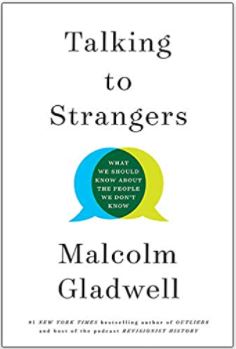The Reading Room

Talking to Strangers
Malcolm Gladwell
Published: 2019, Little, Brown & Co.
Malcolm Gladwell’s ‘Talking to Strangers’ sheds light on the breakdown of communication in the context of troubling social and political issues. It displays his skill of focusing on a particular subject, researching it thoroughly, and then weaving in other thoughts and themes that often appear tangential.
The book appears to refer to communication in its title but is in fact more about miscommunication. How did Fidel Castro fool the CIA for a generation? Why did Chamberlain think he could trust Hitler? The thread that holds as you read the book and meander through its myriad stories is that humans tend to default to the truth – they generally take at face value what people tell them, even when good judgement would suggest otherwise, and their perception of truth is based on their life experiences.
The book starts and ends with an instance of miscommunication with tragic consequences. Gladwell analyses the aggressive policing tactics that indirectly led to the death of an African American woman, Sandra Bland, whose only fault was a minor traffic violation. The routine violation led to a hostile exchange between her and the police officer, after which Bland ended up in jail and, three days later committed suicide in her cell. All this over “stopping someone who should never have been stopped, drawing conclusions that never should have been drawn.” The premise behind this being that in troubled neighbourhoods there could be weapons or drugs in the car. Gladwell writes that this is what happens when a society does not know how to talk to strangers.
The author goes on to take you through a string of stories ranging from the crisis between Cuba and the United States and its fallout, to the story of Bernie Mandoff, the investor who ran the largest Ponzi scheme in history, and further on to the case of Jerry Sandusky, the Penn State University coach convicted of sexual abuse. These three stories, in particular, are based on the theories of psychologist, Tim Levine, who has done extensive research on why people are deceived by strangers.
With that said, in some cases a blanket conclusion of ‘failure to communicate’ may be an oversimplification. Past and present race biases and the Black Lives Matter movement have shown us that we cannot disregard other factors at play, particularly when looking at the Sandra Bland case. We would be wrong to attribute what transpired here purely to two strangers who do not know how to communicate with one another.
There are some examples in the book that come across a little farfetched, for example the use of an episode of the show ‘Friends’ to make a point about how we rely on people’s facial expressions when it comes to reading their inner most feelings, emotions and intentions. To use the expressions and interactions of Rachel, Chandler and the gang as a guide to actual human behavior could be seen as Gladwell sliding too far to the popular-end of “popular science” writing.
In spite of this, Gladwell’s overriding point throughout this book is very thought provoking; we do not know how to correctly talk to strangers and, as a result, are inviting conflict and misunderstanding into our lives in ways that have already had a profound effect in the past, and will likely have grave effect on the future as well.
How can we change our behaviour, and more importantly, should we? That is the real question. How can we correctly read people and trust strangers to act right by us? According to Gladwell, making sense of the stranger “requires humility and thoughtfulness and a willingness to look beyond [them], and take time and place and context into account”, something that is all too often ignored.
Aditee Bhalla
July 2021
The information contained above and in other entries in the Ocean Dial Book Review Series is intended for general information and entertainment purposes only, and should not be relied upon in making, or refraining from making, any investment decisions. No information provided herein should or can be taken to constitute any form of advice or recommendation as to the merits of any investment decision. You should take independent advice from a suitably qualified investment adviser before making any investment decisions.
The CEO Factory: Management Lessons from Hindustan Unilever
Published: 2019, Juggernaut Books
For six decades Hindustan Unilever has remained among India’s top five most valuable companies. No other Corporation in the world has done so well for so long. For the first time comes a book that decodes how this great business works – from a director of the company who has spent his whole career there.
Seven Decades of Independent India: Ideas and Reflections
Published: 2022, Penguin Books India
Has democracy in India fulfilled the aspirations of its people? Have institutions delivered? Have public policies succeeded in making substantial differences to living standards? Is the country secure on its external borders? Would the country become an economic powerhouse? And can India be a leading power in the years ahead?
Ikigai – The Japanese Secret to a Long and Healthy Life
Published: 2016, Cornerstone
We all have an ikigai. It’s the Japanese word for ‘a reason to live’ or ‘a reason to jump out of bed in the morning’. It’s the place where your needs, desires, ambitions, and satisfaction meet. A place of balance. Small wonder that finding your ikigai is closely linked to living longer.


